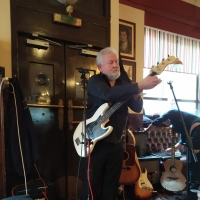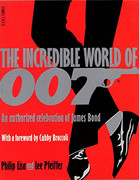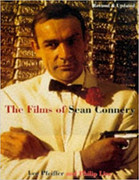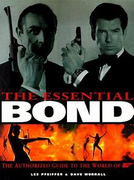AJB Interview with Lee Pfeiffer
 Barbel
ScotlandPosts: 38,068Chief of Staff
Barbel
ScotlandPosts: 38,068Chief of Staff
Our next guest is Lee Pfeiffer, author/co-author of such titles as



He has also worked on the behind the scenes documentaries familiar from DVDs and Blu-Rays. https://www.imdb.com/name/nm0679425/
Please post your questions below!



He has also worked on the behind the scenes documentaries familiar from DVDs and Blu-Rays. https://www.imdb.com/name/nm0679425/
Please post your questions below!
Tagged:


Comments
Again, please pick and choose if I’ve gone too far ...
1. In The Incredible World of 007 you have a great anecdote about Cubby calling you up and asking about writing a book. Do you have any other anecdotes about the wonderful Cubby you’d like to share?
2. Your books take us up to the Brosnan era, could you briefly tell us what your thoughts on Daniel’s tenure as Bond are.
3. You note in your book your first experience of Bond is going to see FRWL - if you had to take one Bond film with you to a desert island, would this be the one?
What were your favourite Bond commentaries that you recorded.?
What are the pros and cons of recording the commentaries for the films?
" I don't listen to hip hop!"
1) In The Incredible World of 007 you have a great anecdote about Cubby calling you up and asking about writing a book. Do you have any other anecdotes about the wonderful Cubby you’d like to share?
That was a very memorable day. I had written a review of Licence to Kill for the New York Daily News and defended the film, which had opened with lackluster grosses in America. I said something about Broccoli and Saltzman’s influence on the action film genre and praised the film itself. Later, I was shocked to get a phone call advising me to “Hold for Cubby Broccoli”. Cubby had seen the article and called to personally thank me, saying it had made his day. He was proud of the film and annoyed at MGM/UA’s marketing campaign which saw the film released the same day as a “Star Trek” film and “Indiana Jones and the Last Crusade”. We chatted for quite a while and he mentioned that he heard I was working on a book about John Wayne, who he said was a friend of his. He asked me to send him a copy when it was published. I did and when he received it, he called and asked me to write an official book about the Bond series. Believe it or not, I didn’t jump at the chance. I explained to him that I would only write the book if I was free to criticize aspects of the series that I wasn’t fond of. To my surprise, he said “Write whatever you want”. But he did ask that we put a caveat in the book explaining that the opinions were not his. I asked my friend Phil Lisa to collaborate on the book and Cubby and Eon gave us free reign. He also invited Phil and I to his home in Beverly Hills where he and his wife Dana greeted us warmly and Cubby provided an interview. I do recall he showed us a leather-bound first draft script for “Dr. No” that still caused him anxiety. When I asked him why, he showed me the infamous section in which the title character was revealed to be a monkey. Cubby told an amusing story about how he chastised Richard Maibaum and Wolf Mankiewicz for coming up with this crazy concept. He later said Wolf wanted his name off the final credits and later came to regret it when the film became a big hit.
When the book came out in the early 1990s (I forget the precise year), I happened to be vacationing in Palm Springs, having just quit the 9-to-5 world in order to pursue a full time career as a writer. This was in the era before mobile phones and my wife Janet and I just happened to be in our room when Cubby tracked us down and called us (I still have no idea how he found out our whereabouts.) He said he had just received the book, which was titled “The Incredible World of 007” and was very enthused about it. He said he kept it next to his bed because he liked to browse through the content. He then said “Let’s celebrate” and invited us to lunch at the Bistro Gardens, his favorite restaurant in Beverly Hills. His wife Dana was there, as was Michael Wilson and licensing director John Parkinson. It was quite a memorable afternoon, as you might imagine.
Cubby was larger-than-life both physically and in terms of personality. He loved talking about movies. We kept in touch and I would ring him up every now and then and he was always good for a half hour conversation. The last time I saw him was in New York when he and Dana invited me for dinner at his favorite Italian restaurant. It was a wonderful evening but I have bittersweet memories of it because it turned out I would be the last person to dine with Cubby before he fell seriously ill and no longer appeared in public. He really was an industry giant but he never lost respect for the people he helped elevate him to that status. He would always talk about valuing the fan’s opinions and in some cases responding personally to their letters.
2) Your books take us up to the Brosnan era, could you briefly tell us what your thoughts on Daniel Craig’s tenure as Bond are?
I’m a great admirer of Craig in the role. I recall being in England when the press announced he would be cast in “Casino Royale”. Reaction was universally negative. There was even a widely-quoted, anonymously written web site called “Craig is Not Bond”, I believe. There was tremendous bad will out there and it must have been upsetting to Barbara and Michael. They were trying to bring the series in a bold new direction and any time you have a new actor as 007, it represents a major risk. I do recall Dave Worrall and I walking through the halls of Pinewood Studios and bumping into Martin Campbell, who directed “Casino Royale”, while the film was in production. I remember him telling us not to listen to any of the rumors and that Craig was doing a great job. That was borne out the night of the London royal premiere. Her Majesty was in attendance and everyone wanted the film to be a success. At the end of the movie where Craig says “Bond…James Bond”, the normally reserved audience erupted in loud cheers. I remember thinking that Martin was proven right. I think each of the Bond actors was well-cast for the period in which they played the role. But as Roger Moore once told me, as successful as he was in his era, his interpretation of the role would be rejected by contemporary audiences. Today’s Bond has to be gritty and realistic. In the 70s and 80s, Roger’s lighter view of the role was what appealed to fans. Craig is too dark for some of the Bond loyalists and I can understand that. I would like to see a bit more humor introduced to the scripts and get away from the very grim scenarios. However, I think he has infused the Bond films with some dynamic elements. He also happens to be an excellent actor. I think there is no way to view his tenure except as a complete success. You may not care for his films on a personal level but there is no doubt they have been extremely well received by the public- and in some cases by the critical establishment that was writing off Bond as played out by the mid-1960s.
3) You note in your book your first experience of Bond is going to see FRWL - if you had to take one Bond film with you to a desert island, would this be the one?
It’s hard to play Solomon when it comes to favourite Bond films, but I guess I’ll have to go with one that is a wholly unoriginal choice: Goldfinger, which perfected the formula for the balance of thrills and humour without going over-the-top on the latter. It also wouldn’t take much to convince me that OHMSS would be an appropriate choice.
4) Have you any future Bond-related projects in mind?
Well, my business partner and sometimes co-author Dave Worrall and I have done many Bond projects over the decades from writing books to making documentaries and even creating and marketing licenced merchandise. Our book “The Essential James Bond” was an enormous success for us; far beyond what we had envisioned in financial terms. It gave us the freedom to start publishing our own magazine, Cinema Retro, which is dedicated to the films of the 1960s and 1970s. Between the magazine and our web site at www.cinemaretro.com (which has a dedicated section for James Bond), we don’t have much spare time. After “The Essential Bond”, we felt it was time to leave the 007 projects to new voices and talents. However, we do occasionally cover Bond in Cinema Retro. We published a rather massive 50th anniversary issue for “Dr. No” that went far beyond what we had originally envisioned. We also dedicated half an issue to the 50th anniversary of “You Only Live Twice”. Most recently, we did a cover story for the 50th anniversary of “OHMSS”, so we still weigh in on Bondian topics. As for writing books, the entire industry has changed and not in a favourable way for authors thanks to the draconian terms demanded by Amazon on the publishing industry. By the time everyone takes their cut of the cover price, there isn’t much left for the authors. We occasionally dabble with the idea of doing another book, but for now Cinema Retro takes up most of our time. As for doing another Bond project in the future, there’s nothing on our radar we’d like to do but I’ve learned to never say never again.
5) What were your favourite Bond commentaries that you recorded?
I don’t know because I’ve never listened to any of them. Neither have I ever listened to any of the many commentary tracks I’ve recorded in recent years for other major films. I never like to revisit projects I was involved with, not because they didn’t turn out well, but because I get too preoccupied with seeing what I could have done better. I do a lot of film lectures at private clubs in New York and I was recently asked to screen “The Making of ‘Goldfinger’” documentary, which I produced with Mark Cerulli and John Cork. By sheer coincidence, Cerulli was in Manhattan on a visit from Hollywood, so we co-hosted the event and watched the film for the first time since 1995. There was quite a bit I had forgotten. The audience loved it enough to invite me back in January to screen the companion documentary “The Goldfinger Phenomenon”. My impressions in watching “The Making of Goldfinger” after almost twenty years is that I’m grateful we made the effort to interview so many wonderful people who were part of the franchise and who are now no longer with us: Ken Adam, Guy Hamilton and so many others. And of course getting the wonderful Patrick Macnee to narrate was a major plus. I had also forgotten that we had found Theodore Bikel’s original screen test for the part of Goldfinger. We only had time to use a few snippets in the final cut, but I remember watching a lot more of his test. It was quite fascinating. We shot some of the interviews in Cubby’s office at Pinewood. But “GoldenEye” was in production at the time so we did other interviews on the set at Leavesden Studios. Pierce Brosnan asked if we could film him on the set for a charity promo. So, I guess you could say we “directed” Pierce early in his tenure as Bond. He later invited me to hang out in his dressing room and gave me an interview for an updated edition of “The Incredible World of 007”. It was all very exciting but nerve-wracking. None of us had made a film before, and MGM and the Broccolis had entrusted us with this high profile project. At times it was chaotic, but we managed to make a very tight deadline. The payoff was when Barbara called me and was very effusive in her praise. She also invited the production team to the New York and London premieres of “GoldenEye”, so that made up for a lot of the frustrations and anxieties. The only frustrating aspect is that I have many hours of interview footage with Bond film alumni that has not seen the light of day.
6) What are the pros and cons of recording the commentaries for the films?
I do remember they were very complex to put together. They were done for laser disc at the time and the technology was a bit primitive. We had so many interviews that I believe we ran two separate commentary tracks which was quite unusual for back then. In terms of recording commentary tracks in general, I personally favor having at least one person join me on the track. All too often, single commentator tracks may be very informative but they often tend to be very dry and professorial. With other people, there is an opportunity to provide differing opinions and lively banter. I have some fellow film scholars that I tend to call on to help with the tracks: Paul Scrabo, Tony Latino, Eddy Friedfeld and Hank Reineke. I guess you can say we’re the New Jersey Rat Pack of commentary tracks but we get the job done on the first take, with only a short break about half-way through to grab a beer or some other libation. Paul is an Emmy-winning sound engineer with his own man-cave that is loaded with state-of-the-art equipment, so we don’t even have to cross the river into Manhattan to record commentary tracks in a studio.
7) How did you find collaborating with your co-authors? Did you find you all held similar views or were there definite opposing views?
As with the commentary tracks, I find it better to collaborate on books. There are different nuances and opinions that you can discuss and reflect upon. Obviously, when writing a book, you have to come to unified conclusions, which sometimes takes a bit of debating to arrive at. On a commentary track, everyone can openly argue with each other but a co-authored book doesn’t lend itself to that possibility. I’ve collaborated with another author, Michael Lewis, on non-Bond books over the years. Obviously, we are in general agreement on our interest in the subject matter and our opinions about the films or actors. But there can be some disagreements so in the writing, we make compromises that incorporate each other’s opinions and present them as a singular point-of-view. I know that Worrall and I have a few differences on some of the Bond films. I like “Licence to Kill” more than he does but I believe we both agree on what the weakest Bonds are: “The Man with the Golden Gun”, “Moonraker”, “A View to a Kill” and “Die Another Day”. One film I know we are at odds about is the spoof version of “Casino Royale”. We did a very extended write-up about in an early issue of “Casino Royale”. That required us both to revisit the film. I’ve always loved it for being the grand, glorious mess that it is but Worrall finds it to be almost unwatchable. It’s a running joke between us but I hope to change his mind someday through persuasive reasoning and a good many lagers.
(Lee Pfeiffer is the co-author (with Phil Lisa) of “The Incredible World of 007” and “The Essential James Bond” (with Dave Worrall). He and Worrall are the publishers of Cinema Retro magazine which is dedicated to films of the 1960s and 1970s. They also run the web site www,cinemaretro.com)
My thanks to Mr Pfeiffer for his detailed replies, and of course to everyone who came up with the questions.
As always thanks to Barbel for organising - much appreciated! -{